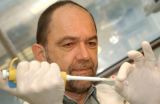Backstabbing bacteria: A new treatment for infection?
2010-09-06
(Press-News.org) Selfish bacterial cells that act in their own interests and do not cooperate with their infection-causing colleagues can actually reduce the severity of infection.
The selfish behaviour of these uncooperative bacteria could be exploited to treat antibiotic-resistant infections, according to research being presented at the Society for General Microbiology's autumn meeting today.
Bacteria work together by using a well-studied communication system called Quorum Sensing (QS). During infection, bacteria talk to each other using QS to coordinate the release of toxins.
Researchers at the University of Nottingham have discovered that in Staphylococcus aureus infections, bacteria defective in QS can benefit from 'opting out' of toxin production. By doing so, they can invest more energy in reproducing – whilst taking advantage of the nutrient-rich infection that is maintained by their neighbours.
By looking after themselves in this way, QS-deficient bacteria are quickly able to outnumber other bacteria that are busy producing toxins. As a result the overall severity of infection is reduced as fewer toxins are produced. "This opens up the interesting possibility of using these uncooperative bacteria to treat infection," said Mr Eric Pollitt who is presenting the study.
The group tested the theory by introducing S. aureus into waxworms that subsequently developed infections. "We found that the QS-deficient bacteria could not only outgrow normal bacteria in the same population, but that they could also invade other cooperating populations to reduce the severity of infection," explained Mr Pollitt. "This means that we could potentially isolate QS-deficient bacteria and use them to treat clinical S. aureus infections."
New approaches for the treatment of S. aureus infections are desperately needed as many strains of the bacterium, such as Meticillin-resistant Staphylococcus aureus (MRSA), are resistant to antibiotics. "Importantly, as any treatment involving QS-deficient bacteria would not be based on antibiotics, it could complement current treatments for S. aureus infections," said Mr Pollitt.
Using bacteria to treat bacterial infections is a potentially useful yet paradoxical approach. "It's an interesting concept of 'fighting like with like'," suggested Mr Pollitt. "This work also highlights that the interactions between bacteria during an infection can be just as important as the interactions between the bacteria and the host."
INFORMATION: END
ELSE PRESS RELEASES FROM THIS DATE:
2010-09-06
While we are often exposed to bacteria in our food which could cause food poisoning, we don't always become ill - why should this be so?
Professor Colin Hill who is presenting his work at the Society for General Microbiology's autumn meeting in Nottingham today describes how bacteria use different tricks to aid their survival inside the body, helping to explain why food poisoning can be so unpredictable.
One of the biggest challenges faced by food-borne bacteria is acid. Acidic conditions, particularly in the stomach and in the gut will kill most microbes found in contaminated ...
2010-09-06
TORONTO, ON - Widespread reports of a decline in the population of bees and other flower-visiting animals have aroused fear and speculation that pollination is also likely on the decline. A recent University of Toronto study provides the first long-term evidence of a downward trend in pollination, while also pointing to climate change as a possible contributor.
"Bee numbers may have declined at our research site, but we suspect that a climate-driven mismatch between the times when flowers open and when bees emerge from hibernation is a more important factor," says James ...
2010-09-06
STOCKHOLM (6 September 2010)—Against a backdrop of extreme weather wreaking havoc around the world, a new report warns that increasingly erratic rainfall related to climate change will pose a major threat to food security and economic growth, especially in Africa and Asia, requiring increased investment in diverse forms of water storage as an effective remedy.
"Millions of farmers in communities dependent on rainfed agriculture are at risk from decreasing and erratic availability of water," said Colin Chartres, director general of the Sri Lanka-based International Water ...
2010-09-06
CAMBRIDGE, Mass. -- Plants are good at doing what scientists and engineers have been struggling to do for decades: converting sunlight into stored energy, and doing so reliably day after day, year after year. Now some MIT scientists have succeeded in mimicking a key aspect of that process.
One of the problems with harvesting sunlight is that the sun's rays can be highly destructive to many materials. Sunlight leads to a gradual degradation of many systems developed to harness it. But plants have adopted an interesting strategy to address this issue: They constantly break ...
2010-09-06
SANTA CRUZ, CA--A tiny optical device built into a silicon chip has achieved the slowest light propagation on a chip to date, reducing the speed of light by a factor of 1,200 in a study reported in Nature Photonics (published online September 5 and in the November print issue).
The ability to control light pulses on an integrated chip-based platform is a major step toward the realization of all-optical quantum communication networks, with potentially vast improvements in ultra-low-power performance. Holger Schmidt, professor of electrical engineering in the Baskin School ...
2010-09-06
One of the key drivers of human evolution and diversity, accounting for changes that occur between different generations of people, is explained by new research published today (Sept 5) by world-renowned scientist Professor Sir Alec Jeffreys, who discovered DNA fingerprinting at the University of Leicester.
Professor Jeffreys has spent over two decades since his landmark discovery in 1984 investigating what he describes as "pretty bizarre bits of DNA" - highly variable repeated parts of DNA called 'minisatellites' - found in the human genome. Sir Alec observed that ...
2010-09-06
Biologists at the University of California, San Diego have discovered that a gene critical for programmed cell death is also important in the loss of adult stem cells, a finding that could help to improve the health and well-being of patients undergoing cancer treatment.
"During chemotherapy or radiation therapy that kills cancer cells by inducing significant DNA damage in their genomes, one of the main side effects for human cancer patients is the depletion of their own adult stem cells, particularly the ones responsible for making new blood and intestine cells. So these ...
2010-09-06
A new website providing busy mums with a central point to discover businesses that provide home delivery and in-home services was recently launched.
The new website - http://www.mumsdelivery.com.au - is a business directory for mums interested in shopping and arranging in-home services from the comfort of their own home. The website is intuitive and easy to navigate, making it simple for users to find the businesses they are looking for.
Mums today are particularly technologically savvy. The 'online mum' demographic is emerging as one of the fastest growing segments ...
2010-09-06
The Bornmann Law Group, PLLC, a debt relief agency servicing all of Arizona, has launched their new informational and advisory blog, http://www.bankruptcy-az.com/wordpress/. This bankruptcy themed blog is written by bankruptcy attorneys and bankruptcy lawyers who advise and help people file for bankruptcy relief under the Bankruptcy Code.
Their blog focuses on bankruptcy planning, Chapter 7 and Chapter 13 filing options, advice on wage garnishments and repossessions, bankruptcy law and advice for those that are experiencing extreme financial difficulty. Recent articles ...
2010-09-06
Movage Movers Enjoy Summer 2010 Discount
1 Month Free Storage with Movage Moving & Storage.
Our qualified staff of professional movers and fleet of new trucks will meet all of your moving needs. We carefully screen all our employees and regularly train them in the latest packing and moving methods. Our crews utilize state-of-the-art equipment to safely transport and deliver most fragile furniture, machinery, fine arts and pianos.
Each vehicle in our fleet is equipped with a Real-Time Vehicle Tracking System, aka GPS (Global Positioning System). Real-time vehicle tracking ...
LAST 30 PRESS RELEASES:
[Press-News.org] Backstabbing bacteria: A new treatment for infection?


